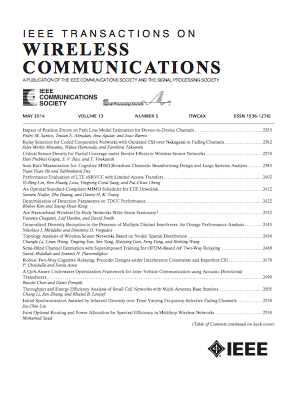大型ris辅助MIMO系统的简化容量公式和相位优化
IF 10.7
1区 计算机科学
Q1 ENGINEERING, ELECTRICAL & ELECTRONIC
引用次数: 0
摘要
可重构智能表面(RIS)技术旨在改善信道传播,进而提高无线通信系统的性能。改进的程度很大程度上依赖于RIS的相移优化,即被动波束形成设计。本文提出了在大型ris辅助多输入多输出(MIMO),即MIMO- ris系统中简化该过程的新方法。更具体地说,我们在大量元件/天线渐近状态下推导了MIMO-RIS容量表达式的两种新的简化封闭形式近似(CFAs),并确定了它们与经典MIMO-RIS容量表达式紧密近似的各种场景。然后,我们设计了两种新的简化的RIS相位优化算法,用于降低计算复杂度的无损和实用的元表面。我们还证明,在某些实际场景中,可以使用非常简单的指南来设置MIMO-RIS系统的阶段。数值计算验证了我们的CFAs和简化的RIS相移优化算法的准确性。它们还表明,我们的简化方法可以提供与现有方法相似甚至更好的容量性能,特别是对于各种场景下的实际元表面。本文章由计算机程序翻译,如有差异,请以英文原文为准。
Simplified Capacity Formulation and Phase Optimization in Large RIS-Aided MIMO Systems
Reconfigurable Intelligent Surface (RIS) technology is designed to improve channel propagation and, in turn, the performance of wireless communication systems. The extent of the improvement heavily relies on the phase shift optimization, a.k.a. passive beamforming design, at the RIS. This paper proposes novel approaches for simplifying this process in large RIS-aided multiple-input multiple-output (MIMO), a.k.a. MIMO-RIS, systems. More specifically, we derive two novel simplified closed-form approximations (CFAs) of the MIMO-RIS capacity expression in the large number of elements/antennas asymptotic regime and identify various scenarios for which they tightly approximate the classic MIMO-RIS capacity expression. We then design two novel simplified RIS phase optimization algorithms for lossless and practical metasurfaces with reduced computational complexity. We also demonstrate that, in certain practical scenarios, very simple guidelines can be used for setting the phases of MIMO-RIS systems. Numerical evaluations validate the accuracy of our CFAs and simplified RIS phase-shift optimization algorithms. They also show that our simplified approaches can deliver either similar or even better capacity performance than existing methods, especially for practical metasurfaces, in various scenarios.
求助全文
通过发布文献求助,成功后即可免费获取论文全文。
去求助
来源期刊
CiteScore
18.60
自引率
10.60%
发文量
708
审稿时长
5.6 months
期刊介绍:
The IEEE Transactions on Wireless Communications is a prestigious publication that showcases cutting-edge advancements in wireless communications. It welcomes both theoretical and practical contributions in various areas. The scope of the Transactions encompasses a wide range of topics, including modulation and coding, detection and estimation, propagation and channel characterization, and diversity techniques. The journal also emphasizes the physical and link layer communication aspects of network architectures and protocols.
The journal is open to papers on specific topics or non-traditional topics related to specific application areas. This includes simulation tools and methodologies, orthogonal frequency division multiplexing, MIMO systems, and wireless over optical technologies.
Overall, the IEEE Transactions on Wireless Communications serves as a platform for high-quality manuscripts that push the boundaries of wireless communications and contribute to advancements in the field.

 求助内容:
求助内容: 应助结果提醒方式:
应助结果提醒方式:


